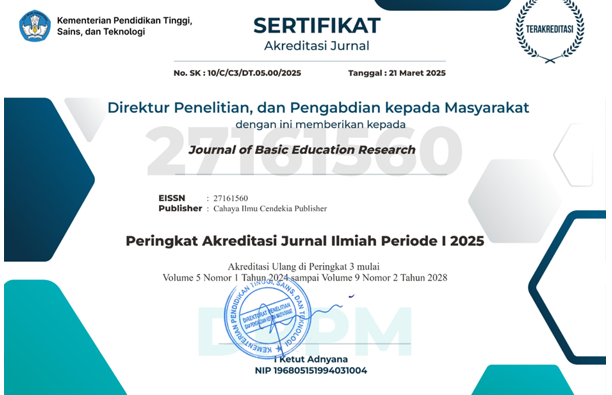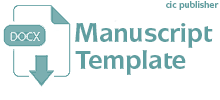Enhancing the Mastery of Basic Integer Operations Among Grade 8 Learners in Secondary Education Through MathSPARK
Abstract
Purpose of the study: Mastery of basic integer operations, an essential foundational skill, enables learners to progress into complex mathematical concepts. Accordingly, this study investigates the effect of MathSPARK as an intervention material on learners’ mastery of this skill.
Methodology: This study employed an explanatory-sequential mixed methods research design, which involved Grade 8 students from a public secondary school in Sorsogon City who met specific criteria. The data were collected through validated integer tests and a researcher-made questionnaire on student perceptions. The quantitative data were analyzed using both descriptive and inferential statistics, while the qualitative data were subjected to thematic analysis.
Main Findings: The number of those who reached the “Mastered” and “Closely Approximating Mastery” levels increased, and those at the lower mastery levels were reduced. Statistical analysis of the results confirmed that the improvement in the learners’ mastery is significant; hence, MathSPARK is effective. Moreover, varied insights from the learners supported the findings, highlighting both the benefits and challenges they encountered.
Novelty/Originality of this study: This study offers new insights into how to improve the mathematical skills of the learners by exploring the potential of available digital devices. It also provides an opportunity for a novel approach to enhance learning performance amidst challenges brought about by class disruptions and in an educational setting with limited resources, while taking advantage of what is available to learners
References
UNESCO, UNESCO and Education: Our Mission. Paris, France: UNESCO Publishing, 2002.
Department of Education (DepEdPH), “Republic act 10533: Enhanced basic education act of 2013,” DepEd PH, 2024.
UNICEF, “SDG Goal 4: Quality Education,” UNICEF Data, 2017.
Department of Education, K to 12 Mathematics Curriculum Guide. Pasig City, Philippines, 2016. [
I. N. Ghadi, K. A. Bakar, and B. Njie, “Influences of critical thinking dispositions on critical thinking skills of undergraduate students at a Malaysian public university,” J. Educ. Res. Rev., vol. 3, no. 2, pp. 23–31, Feb. 2015.
Z. Kaplan, “What are problem-solving skills? Definition and examples,” Forage, 2023.
L. Rusmin, Y. Misrahayu, F. Pongpalilu, R. Radiansyah, and D. Dwiyanto, “Critical thinking and problem-solving skills in the 21st century,” Join: J. Soc. Sci., vol. 1, no. 5, pp. 144–162, 2024, doi: 10.59613/svhy3576.
C. Chi, “Philippines still lags behind world in math, reading and science — PISA 2022,” Philstar.com, Dec. 6, 2023.
Philippine Daily Inquirer, “Local, international tests show urgent need to improve quality of education,” Inquirer Opinion, 2023.
M. K. Tan, “Deped’s priority should be skills training for teachers,” INQUIRER.net, 2024.
Department of Education, “Deped highlights digital rise program as key player in addressing challenges in education quality,” 2022.
R. Muneer, M. Ibrahim, and R. Begum, “Examining the challenges and factors affecting technology integration in the learning process,” Pakistan J. Educ. Res., vol. 6, no. 4, 2023.
NEAP Region V, “About B-COOL logo,” Facebook, 2023.
Mathnasium of Littleton, “Understanding math learning gaps,” Mathnasium, 2020.
J. G. Francisco, C. A. R. Alova, I. M. C. Alova, and S. L. Apohen, “Performance of grade 8 students in mathematics intervention program,” Int. J. Multidiscip. Appl. Bus. Educ. Res., vol. 3, no. 9, pp. 1742–1748, 2022, doi: 10.11594/ijmaber.03.09.14.
A. D. Yazon and A. V. Leonano, “Effectiveness of mathematics intervention program (MIP) among primary school teachers,” PEOPLE: Int. J. Soc. Sci., vol. 5, no. 2, pp. 729–747, 2019, doi: 10.20319/pijss.2019.52.729747.
K. A. R. Villanueva, “Basic arithmetic skills intervention for classes (B.A.S.I.C.): Towards improved arithmetic skills for junior high school mathematics,” M.S. thesis, De La Salle Univ., Manila, Philippines, 2021.
B. A. E. Nicolasora, M. L. Labeña, and G. T. Lumantas, “Numeracy intervention during pandemic using deliberate practice and Internet-supported technology,” J. Innov. Teach. Learn., vol. 1, no. 1, pp. 56–61, 2021, doi: 10.12691/jitl-1-1-10.
C. Chi, “DepEd launches reading, math and science programs in learning recovery plan,” Philstar, Jul. 7, 2023.
Department of Education, “Deped highlights digital rise program as key player in addressing challenges in education quality,” 2022.
Department of Education – Sorsogon City, “Division implementation of oplan kwenta: Mastering math basic during catch-up fridays,” 2024.
Gonzaga University, “Qualitative research: Mixed methods research,” LibGuides, 2025.
C. Andrade, “The inconvenient truth about convenience and purposive samples,” Indian J. Psychol. Med., vol. 43, no. 1, pp. 86–88, 2020, doi: 10.1177/0253717620977000.
L. A. Palinkas et al., “Purposeful sampling for qualitative data collection and analysis in mixed method implementation research,” Admin. Policy Ment. Health Ment. Health Serv. Res., vol. 42, no. 5, pp. 533–544, 2015, doi: 10.1007/s10488-013-0528-y.
S. Malik, “Learning theory of cognitivism and its implications on students’ learning,” World Wide J. Multidiscip. Res. Dev., vol. 7, no. 5, pp. 67–71, 2021.
B. W. Yang, J. Razo, and A. M. Persky, “Using testing as a learning tool,” Am. J. Pharm. Educ., vol. 83, no. 9, p. 7324, 2019, doi: 10.5688/ajpe7324.
R. F. Bruner, “Repetition is the first principle of all learning,” 2001.
J. Nurnberger-Haag, J. Kratky, and A. C. Karpinski, “The integer test of primary operations: A practical and validated assessment of middle school students’ calculations with negative numbers,” Int. Electron. J. Math. Educ., vol. 17, no. 1, 2022, doi:10.29333/iejme/11471.
Department of Education, Research Management Guidelines (DepEd Order No. 16, s. 2017), Pasig City, Philippines, 2017.
Department of Education, Maximizing the Utilization of the National Achievement Test (NAT) Results to Raise the Achievement Levels in Low Performing Schools (DepEd Memorandum No. 160, s. 2012), Pasig City, Philippines, 2012.
P. Mishra, C. M. Pandey, U. Singh, A. Gupta, C. Sahu, and A. Keshri, “Descriptive statistics and normality tests for statistical data,” Ann. Card. Anaesth., vol. 22, no. 1, pp. 67–72, 2019, doi: 10.4103/aca.ACA_157_18.
J. In and D. K. Lee, “Alternatives to the p value: Connotations of significance,” Korean J. Anesthesiol., vol. 77, no. 3, pp. 316–325, 2024, doi: 10.4097/kja.23630.
C. D. Ariate, “Development and validation of off-line Web Quest for Grade 7 mathematics students,” M.S. thesis, Sorsogon State Univ., Sorsogon City, Philippines, 2023.
W. W. N. Chong, M. Shahrill, D. Asamoah, and S. N. A. Latif, “Non-digital card game and year 8 students’ performance in integers,” J. Math. Sci. Teacher, vol. 2, no. 1, Art. em007, 2022, doi: 10.29333/mathsciteacher/11928.
A. Haleem, M. Javaid, M. A. Qadri, and R. Suman, “Understanding the role of digital technologies in education: A review,” Sustain. Oper. Comput., vol. 3, pp. 275–285, 2022, doi: 10.1016/j.susoc.2022.05.004.
E. M. Panergayo and J. E. Aliazas, “Google Classroom adoption as learning management system in senior high school using technology acceptance model,” J. Pendidikan Progresif, vol. 13, no. 2, pp. 355–368, 2023, doi: 10.23960/jpp.v13.i2.202355.
J. E. Simarmata and F. Mone, “The COVID-19 pandemic era: The effectiveness of Google Classroom media in discrete mathematics learning in terms of student learning outcomes,” MES J. Math. Educ. Sci., vol. 7, no. 1, pp. 21–28, 2021, doi: 10.30743/mes.v7i1.4381.
Rafniwati, S. Yona, Dekdi, and Herlinawati, “The effects of digital learning media to improve mathematics learning outcomes and motivation of seventh grade junior high school students,” in Proc. Int. Conf. Educ. Innov. (ICEI), vol. 2, no. 1, 2025.
F. Saccardo, G. Decarli, V. I. Missagia, M. Andrao, F. Gini, M. Zancanaro, and L. Franchin, “Emotions and interactive tangible tools for math achievement in primary schools,” Front. Psychol., vol. 15, Art. 1440981, 2024, doi: 10.3389/fpsyg.2024.1440981.
L. M. Vinuesa and P. R. García, “Expected usefulness of interactive learning platforms and academic sustainability performance: The moderator role of student enjoyment,” Sustainability, vol. 16, no. 9, Art. 3630, 2024, doi: 10.3390/su16093630.
Copyright (c) 2025 Arvin Ebio, Annie Buenaflor

This work is licensed under a Creative Commons Attribution 4.0 International License.
Authors who publish with this journal agree to the following terms:
- Authors retain copyright and acknowledge that the Journal of Basic Education Research is the first publisher licensed under a Creative Commons Attribution 4.0 International License.
- Authors are able to enter into separate, additional contractual arrangements for the non-exclusive distribution of the journal's published version of the work (e.g., post it to an institutional repository or publish it in a book), with an acknowledgment of its initial publication in this journal.
- Authors are permitted and encouraged to post their work online (e.g., in institutional repositories or on their website) prior to and during the submission process, as it can lead to productive exchanges and earlier and greater citation of published work.





.png)


.png)
.png)


















